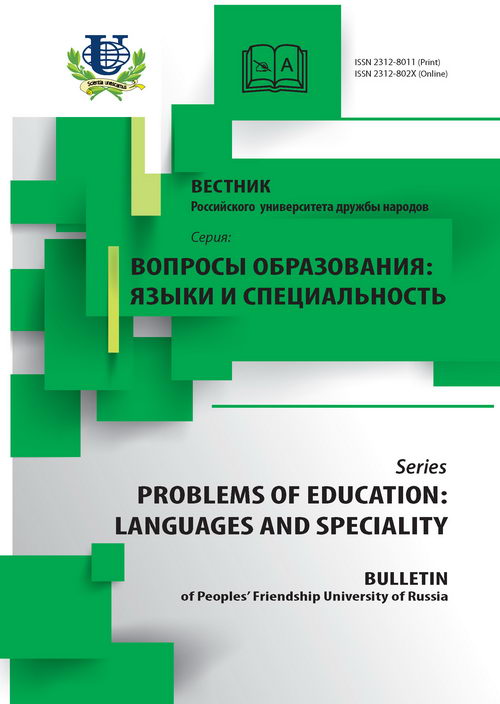No 1 (2008)
EDITORIAL
VERBAL ASSOCIATIONS AS THE CULTURAL PHENOMENON. ASSOCIATIVE EXPERIMENT
Abstract
The aim of the article is to analyze verbal associations as the cultural phenomenon and to show, that an associative experiment is one of the most reliable and objective means to study the language conscience of an individual and ethnic nation as a whole. The analysis is based on the data from the Dictionary of the associative norms and my own associative experiment.
Polylinguality and Transcultural Practices. 2008;(1):5-9
 5-9
5-9


 10-17
10-17


HARMONIZATION OF NATIONAL THESAURI AS A NECESSARY CONDITION OF HARMONIZATION OF POLITICAL DISCOURSE
Abstract
In the XXI century mankind faced the problem of disharmony of global political discourse. The disharmony is mainly caused by incompatibility of concepts in mentality of different nations, political parties, confessions, etc. Consequently this problem could be successfully solved if national thesauri are harmonized.
Polylinguality and Transcultural Practices. 2008;(1):18-25
 18-25
18-25


SCENARIOS, STRATEGIES AND TACTICS OF RUSSIAN SPEECH INTERACTION
Abstract
Scenarios, strategies and tactics of Russian speech interaction are considered in the article within the framework of recent studies in cognitive linguistics and pragmatics. The assortment of communicative competencies of foreign learners of Russian will be enlarged if they learn to identify, interpret and use scenarios of Russian speech interaction.
Polylinguality and Transcultural Practices. 2008;(1):26-30
 26-30
26-30


OCCASIONAL WORDS AS AN ELEMENT OF «OUTRAGEOUS» VOCABULARY IN THE POETRY OF RUSSIAN FUTURISTS
Abstract
The article introduces a notion of «outrageous» vocabulary. Investigating a futurist text, the author points out occasional words as an element of «outrageous» vocabulary and studies various ways of its usage to achieve an outrageous effect.
Polylinguality and Transcultural Practices. 2008;(1):31-35
 31-35
31-35


 36-42
36-42


RELIGIOUS DISCOURSE IN THE LITERARY TEXT AS A LINGUISTIC PROBLEM
Abstract
In the center of attention of the researcher there are such concepts, as a discourse and a religious discourse. The article searches a religious discourse in the literary text, concept «The God» - one of the main concept of the given type of a discourse is defined and analyzed on wurks of I.S. Shmelev and V.A. Bakhrevskiy.
Polylinguality and Transcultural Practices. 2008;(1):43-49
 43-49
43-49


 50-53
50-53


CONCEPT IN LINGUODIDACTIC ACTIVITIES OF LSP TEACHER
Abstract
The article focuses on linguocognitive characteristics of the concept that are relevant to teach LSP. Functional repertories of the concept are evaluated from the Didactics angle. The core of correlation between the concept, notion, and meaning is revealed. The Competence Approach is used to ground an urgent need to develop and train skills of interpreting specialized professional knowledge concepts.
Polylinguality and Transcultural Practices. 2008;(1):54-59
 54-59
54-59


TO THE QUESTION ON DIFFERENTIATION OF FUNCTIONAL-SEMANTIC TYPES OF SPEECH
Abstract
Article is devoted to revealing some linguistic-didactic aspects of differentiation of functionalsemantic types of speech. The various points of view for research were analyzed, problem zones came to light. The algorithm of definition of functional-semantic type of speech for texts is offered. The trainee can take in advantage during his speech activity in academy sphere.
Polylinguality and Transcultural Practices. 2008;(1):60-66
 60-66
60-66


DIFFERENTIAL APPROACH TO TEACHING RUSSIAN LANGUAGE
Abstract
In the article a new interpretation of differential approach to teaching Russian language is suggested. The idea of this approach reflects the necessity of optimization of educational process, improvement of quality of teaching and learning due to involvement into the educational process modern methods and forms of teaching, attention to peculiarities of the development of personality.
Polylinguality and Transcultural Practices. 2008;(1):67-70
 67-70
67-70


TEACHING FOREIGN STUDENTS OF NON-PHILOLOGIC SPECIALITIES THESИS WRITING
Abstract
In the article the role of thesès writing in the process of formation of communicative and professional competence of foreign students is determined, main strategies of thesès writing depending upon types of mikrotexts, transformations of language units are also analysed.
Polylinguality and Transcultural Practices. 2008;(1):71-80
 71-80
71-80


SCIENTIFIC STYLE: COMPETENCE APPROACH TO TEACHING AT BASIC LEVEL
Abstract
The article focuses on such topics as combination of aspects in teaching LSP (Language for Special Purposes) at the elementary level for students who further plan to obtain degree in Medicine and Biology. The role of functional grammar, text corpus, training pronunciation skills, using IT technologies in modern didactic complex at the stage of introductory subject-oriented course are discussed.
Polylinguality and Transcultural Practices. 2008;(1):81-88
 81-88
81-88


STYLSTICS AND RHETORIC. THE BASICS OF JUDICIAL ORATORY
Abstract
The article is dedicated to the judicial oratory - one of the most important parts of the jurist’s profession, to the stylistics and rhetoric and to their role in professional education. While forming a set of knowledge, a humanitarian way of thinking is elaborated.
Polylinguality and Transcultural Practices. 2008;(1):89-95
 89-95
89-95


ON THE FORMATION OF ONOMASTYC COMPETENCE OF A READER
Abstract
In the article functional, pragmatic and linguistic potential of names is under analyses, their role in the process of interpretation of semantic aspect of literary text is also revealed, three levels of reception of onomastyc and poetic unites connected with the concept of onomastyc competence of a reader are defined, specificity of functioning of literary names in A.I. Solzhenitsin’s works is investigated.
Polylinguality and Transcultural Practices. 2008;(1):96-99
 96-99
96-99


ON THE CREATIVE METHOD OF THE WRITERS OF REVOLUTION COMMUNITY «PEREVAL»
Abstract
The article reveals a new angle of analysis of literary discussions about the creative method of the second half of 1920’s. The traditional interpretation of the role of «Pereval» in the process of formation of common creative method of Russian literature is changed.
Polylinguality and Transcultural Practices. 2008;(1):100-106
 100-106
100-106


THE MYTHOPOETICS OF THE RUSSIAN EPICAL PROSE 1930TH-1950TH: THE QUESTION OF NATIONAL CONSCIOUSNESS
Abstract
The article reveals the mythopoetical characteristics of the Russian prose of the 1930th and 1950th. The author underscores the influence of the attempt to recreate the evolution of the national consciousness on the mythopoetical structure of the epical prose, which leads to the creation of a specific neomyth.
Polylinguality and Transcultural Practices. 2008;(1):107-114
 107-114
107-114


 115-119
115-119















